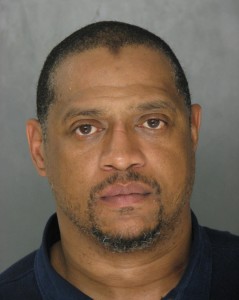Panel must decide whether Damon Wylie acted maliciously or in self-defense
By Kathleen Brady Shea, Managing Editor, The Times
The fatal stabbing nearly a year ago of a 41-year-old Coatesville man was never a who-done-it: Police quickly issued an arrest warrant for another city resident, Damon E. Wylie, 47.
After a week of hearing evidence in the case, a Chester County jury began deliberations Friday on whether Assistant District Attorney Bonnie Cox-Shaw presented sufficient evidence to substantiate her claim that Wylie should be convicted of first-degree murder for the stabbing death of Marcus L. Miles on July 27 or whether the evidence supports Assistant Public Defender Sheryl Willson’s contention that Wylie acted in self-defense.
Police said when they responded on July 27 to the 700 block of Diamond Alley for a reported stabbing, they found Miles collapsed at 10:56 p.m. with multiple stab wounds in the chest. He was transported to Paoli Memorial Hospital, where he was pronounced dead at 1:05 a.m., according to testimony. Wylie was located later that day at Crozer Chester Medical Center, where he had gone to seek treatment for his injuries, police said.
In her closing argument, Cox-Shaw acknowledged that witnesses said Miles had been trying to provoke a fight with Wylie that day. “He didn’t start it,” she said of the defendant. “But he certainly finished it …It didn’t have to end that way.”
Willson countered that Wylie had been doing his best to make peace with Miles, who first approached Wylie angrily at the Midway bar, a confrontation viewed by other witnesses. Willson said Wylie managed to walk away but wasn’t so fortunate hours later when Miles shoved him into the outside wall of an unoccupied Diamond Alley residence. “Cuz, whatsup? I love you, cuz,” Willson quoted Wylie as responding.
She said Wylie went inside the residence to get away from Miles – who was “acting like a crazy maniac” – but a relentless Miles followed him, eventually grabbing a pair of scissors and coming after Wylie, who permanently injured his hand when he wrested them away, she said, adding that Wylie was still pleading with Miles to stop the attack. She said Wylie had no desire to hurt Miles “until he has no choice.”
Cox-Shaw scoffed at the notion that Wylie had no options, pointing out the 240-pound defendant inflicted 14 stab wounds on the 165-pound victim. The prosecutor argued that Wylie could have taken Miles out “with one good punch.” Instead, “he pulls out a pair of scissors, stabbing the victim multiple times …It’s exactly what it looks like: It’s a murder,” she said.
The fact that Wylie didn’t call for help, fled the scene, and sought medical assistance the next day in Delaware County reinforced his guilt, Cox-Shaw said.
Willson said Wylie didn’t call for help because he had no idea Miles had been fatally wounded until he awakened from hand surgery at the hospital to find detectives in his room. According to testimony, after Miles had been stabbed, the defendant exited the rear of the building and Miles walked out the front door before collapsing on the porch.
If Wylie had wanted to disappear, he would likely have given a fake name at the hospital, Willson said. “What he did in that house was justified,” Willson told the jury. “He’s been waiting a year for you 12 people to tell him he didn’t murder his friend,” she said.
Cox-Shaw disagreed, reminding jurors that a forensic pathologist had testified about the force required for the scissors to penetrate the victim’s skull as they did. She also noted that Wylie never told anyone at the hospital that he had been attacked until he was confronted by police. “If you’ve done nothing wrong, you shouldn’t have to leave the scene,” Cox-Shaw said.







